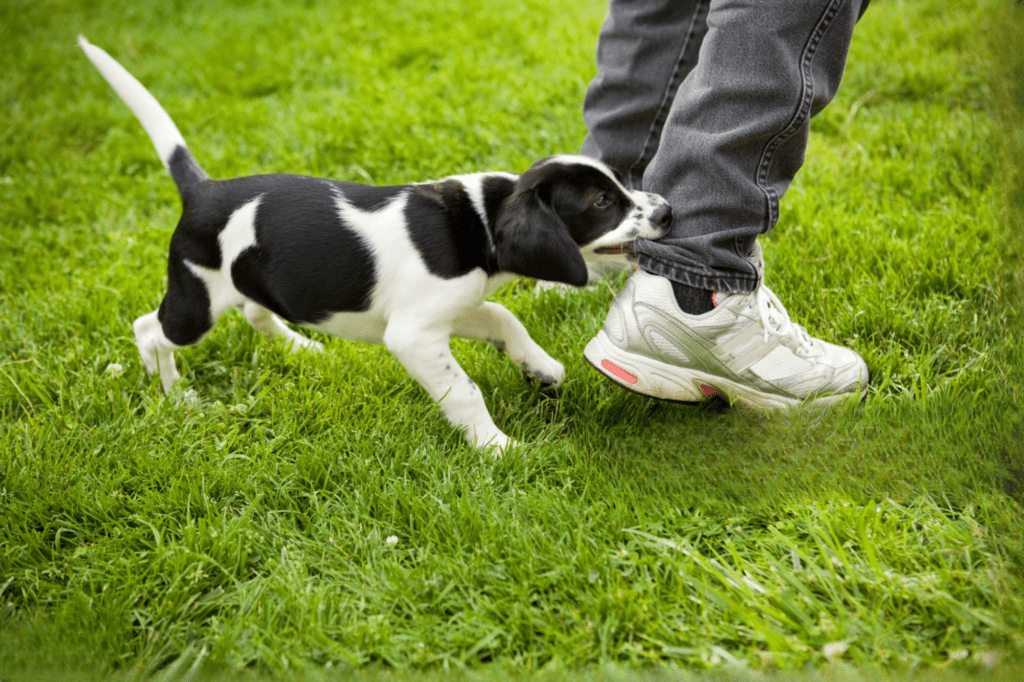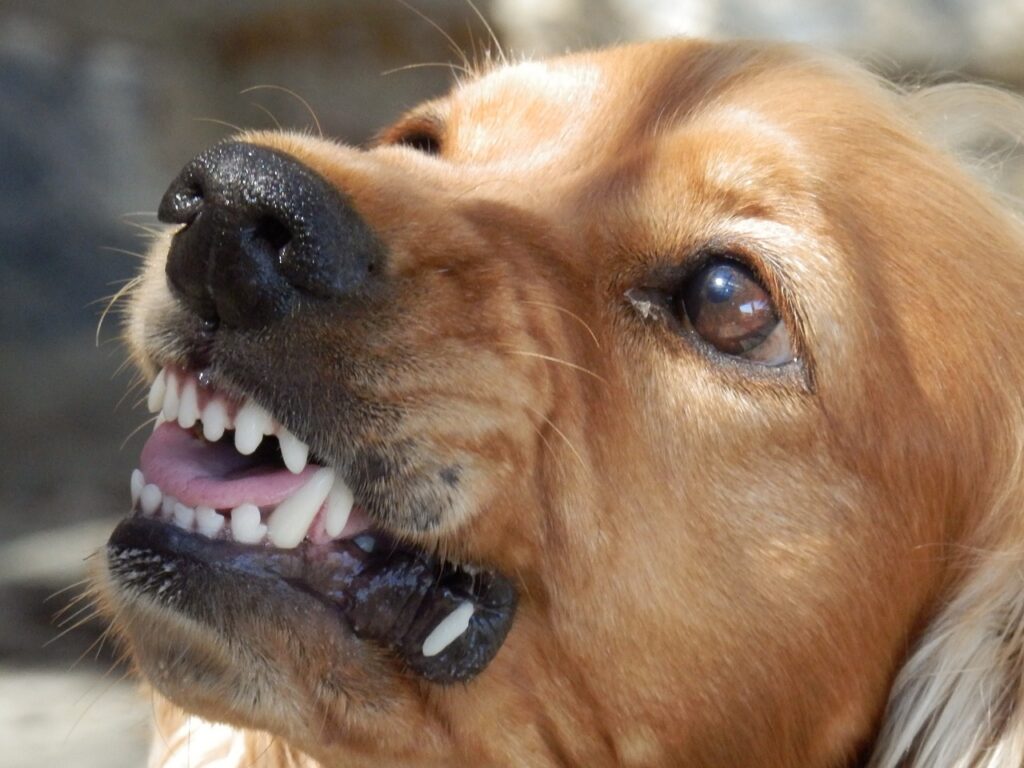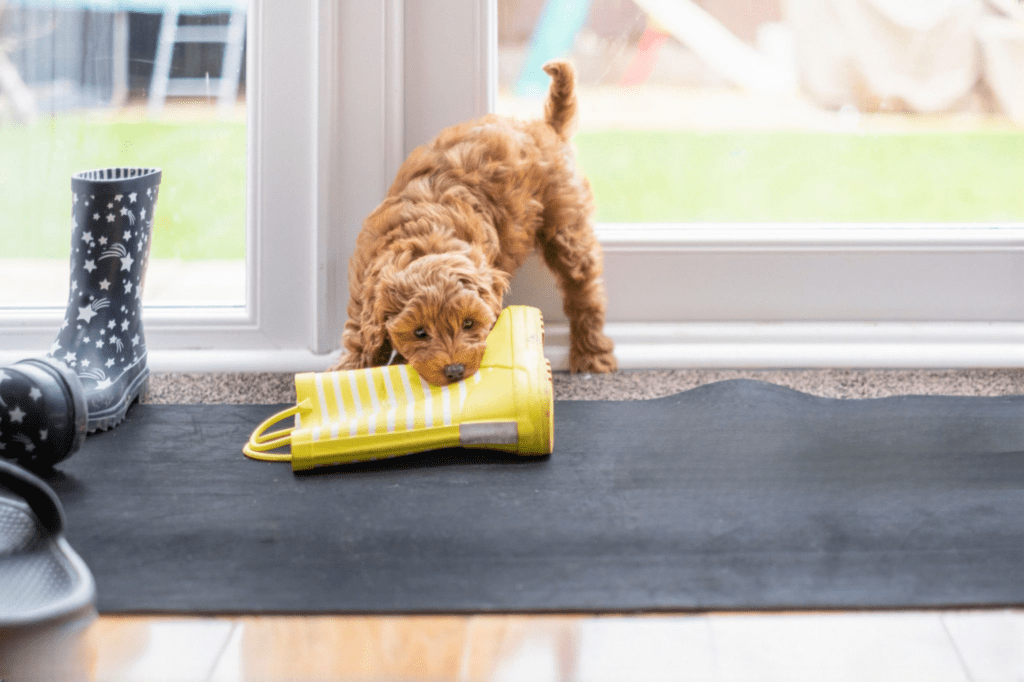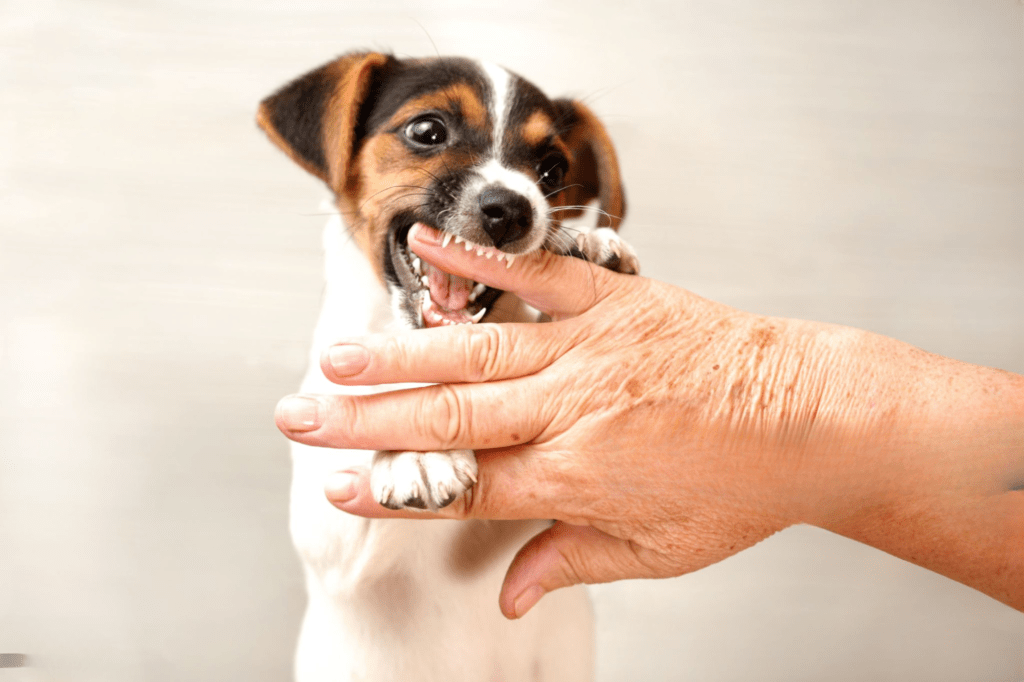Puppies usually stop biting at the age of twelve months. As they explore their surroundings and go through the teething process, mouthing and nibbling are common during their early months.
The following are some causes of puppies stop biting:-
1. Play Mouthing:- Just like when they wrestle or growl, puppies play by mouthing. The other puppy usually squeals to let you know when they’re uncomfortable if they bite their littermate too hard.
2. Teething:- Puppies cut their adult teeth between four and six months of age. Their increased mouthiness during teething may cause them to gnaw on you and other objects.
3. Hunting Behaviour:- Due to their innate hunting instincts, puppies may bite. They may turn their hunting behaviour towards people if they don’t have any siblings with whom to practise it.
4. Exploration:- Puppies investigate their environment with their mouths and teeth. To determine if an object is alive or inert, they might test it.
5. Breed Variations:- Certain breeds are inherently more gregarious than others.
To Stop puppies habit of biting:-
Start Early:- Establish limits early on in your training.
Positive Reinforcement:- Rather than attempting to completely eradicate biting, teach appropriate behavior.
Redirect:- Give them chew toys and divert their focus if they start biting.
Consistency:- Maintain consistency in your reactions and cues.
Always remember that training your dog to be well-mannered as an adult requires patience and consistency!
How can I train my puppies to stop biting?
It is important for both your and your puppies development that they learn to stop biting!
The following are some efficient methods:-
1. Bite Inhibition:- Puppies should be trained to moderate the force of their bites through bite inhibition. A high-pitched “ow!” sound should be made to indicate pain when they nip too hard. Give them credit and a treat if they back off.
2. Game Over Rule:- Stop playing the game right away if your puppies biting. Not an exemption. Reprimanding them verbally or physically is not the best course of action.
3. Provide alternatives:- Have chew toys on hand for your puppy. When they bite, turn your focus to something suitable for them to chew on.
4. Crate Calmness:- If your puppy becomes overly energetic or agitated, carefully put them in their crate. It aids in their relaxation and teaches them restraint.
Recall that patience and consistency are essential to train your puppies stop biting. Cheers to your training!


What are some typical mistakes made when training a puppies to stop biting?
It is important to steer clear of common blunders when training a puppy to guarantee successful and enjoyable learning experiences.
When puppies stop biting, be careful of the following prevents:-
1. Not Starting Early Enough:- Start training as early as eight weeks of age. Early education establishes the foundation for appropriate socialization and behavior throughout life.
2. Inconsistency in Cues (Commands) and Behavior:- Give all family members the same cues (commands). Giving your puppy conflicting instructions can impede their development.
3. Repetition of a Cue:- Steer clear of repeatedly giving cues. Rather, concentrate on properly teaching cues so that your puppy will react on the first attempt.
4. Applying Punishment or Negative Reinforcement:- Traditional approaches involving punishment have less impact. It is more advantageous to reward desired behavior through positive reinforcement.
5. Aversive Sprays and Noises:- Steer clear of using aversive instruments such as loud noises or sprays. It is preferable to use positive reinforcement.
6. Ignoring Socialization:- It’s Important to Get Socialized Correctly. To help your puppy develop confidence, introduce them to a variety of people, animals, and settings.
7. Ignoring Recovery and Rest:- Puppies require enough sleep. Overtraining may result in fatigue and behavioral problems.
8. Neglecting Proper Nutrition:- A balanced diet promotes general behavior and health.
Recall that the secrets to a successful puppy training program are persistence, patience, and positive reinforcement!


How can I house-train my puppy effectively?
Maintaining a clean home and a harmonious relationship with your puppy depends on house training.
Here are some successful strategies to assist you in reaching your goals:-
1. Crate Training:-
- Make good use of a crate as a useful tool. Since dogs are den animals by nature, they don’t like to urinate in their beds.
- Make sure the crate is the right size, with enough space for your puppy to lie down, turn around, and stand.
- Create a cozy and secure environment in the crate by introducing your puppy to it gradually.
- Reward them when they go potty outside and keep a close eye on them when they are outside the crate.
2. Paper Training:-
- Use newspaper or puppy pads to make an indoor potty area.
- Set up the pads in a dependable location and urge your dog to use them.
- To make the transition to outside potty training, gradually move the pads closer to the door.
3. Indoor Potty Training:-
- Provide your dog with easy access to an indoor potty area.
- Use indoor-use artificial grass patches or comparable items.
- When your puppy uses the allotted space, give them praise and treats.
4. Regular Outside Walks:-
- Take your puppy outside on a regular basis, particularly after meals, during playtime, and upon waking.
- Give them praise when they go potty outside.
- Exercise patience and constancy.
5. Keep in mind these important advice:-
- Monitor your dog’s food intake to determine when they should urinate.
- Retain a regular routine for eating, playing, and bathroom breaks.
- Offer consistent exercise to aid in motility.
- Use positive reinforcement to reinforce outside potty behavior.
- Cheers to your successful house training!


What are some safe chew toys for puppies?
When selecting safe chew toys for your puppy, take into account options that are long-lasting, non-toxic, and suitable for their size and age.
The following suggestions are provided:-
1. Nylabone Bacon-Flavored Key Ring Exclusive to Puppies:-
- Constructed from sturdy nylon.
- Fulfils your puppy’s desire to gnaw.
- Tactile keys ease gum irritation and aid in tooth cleaning.
2. Kong Dog Toys:-
- Extremely well-liked and safe.
- A unique teething rubber solution cleans teeth and calms gums.
- Comes in different sizes and shapes.
3. Nylabone Dura Chew Ring Bone Sets or Youngever:-
- Rubber toys of industrial quality.
- Made for chewing and teething.
- Safe and long-lasting for puppies.
4. Emily Pets Dog Chew Toy:-
- Ball toy with a tug rope and suction cup.
- A TPR ball for soft dental care for puppy teeth.
- Offers amusement and comforts gums.
5. Dog Toys by Goofy Tails Coffee Wood:-
- Free of caffeine and splinters.
- A safe and natural puppy toy.
- Offers mental stimulation and support for dental care.
6.Foodie Puppies Natural Latex Rubber Squeaky Ball Dog Toy:-
- The adorable puppy paw design of the Foodie Puppies Natural Latex Rubber Squeaky Ball Dog Toy.
- Fits small to medium-sized dogs.
- Sturdy and secure for playing.
When your puppy is playing, keep an eye on them and replace any broken toys right away. Chewing pleasure!

